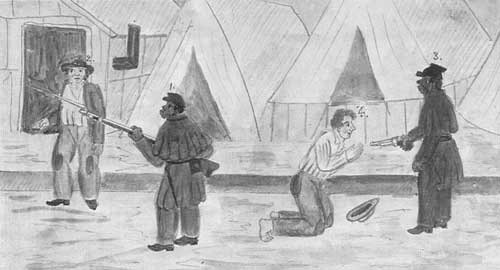|
FATIGUE DUTY
From the outset, white general officers preferred to employ their
black soldiers as laborers, to free up white troops for combat. In
certain instances, the decision made good sense militarily. White units
had more combat experience, and any commander would prefer to take
veterans into battle, as opposed to "green" troops. Yet many
high-ranking officers assigned black soldiers to fatigue labor simply
because they viewed it as inferior duty for an inferior race. They
doubted if black troops could endure the rigors of combat and drew on a
variety of reasons, from climate to personality characteristics of black
men, to justify their decisions.
African Americans understood that only on the battlefield could they
challenge racial stereotypes and win true equality in the postwar world.
They willingly undertook their fair share of labor, but when the
practice deprived them of time to drill for weeks or months on end and
kept them out of combat time after time, they voiced their protests.
"Instead of the musket It is the spad[e] and the Wheelbarrow and the
Axe," complained a private to President Lincoln. Numerous general
officers used them so frequently for fatigue labor that they felt like
slaves in Yankee blue. "Instead of Elevation it Seems more like
Degradation," a private insisted. Instead of fighting Confederates, they
devoted their days to burial details, policing camps of white soldiers,
and throwing up fortifications for white soldiers to occupy.

|
THIS CARICATURE OF BLACK SOLDIERS GUARDING CONFEDERATE PRISONERS WAS
SKETCHED BY A SOUTHERNER HELD AT POINT LOOKOUT PRISON IN MARYLAND.
(MARYLAND HISTORICAL SOCIETY, BALTIMORE)
|
White officers in the USCT too, found the practice humiliating. Why
take such pains to select highly qualified individuals to command these
men, only to have these officers direct labor gangs. "We have been
discussing the propriety of going back to the former nomenclature,"
grumbled a major, "as being much more in Keeping with our business,
towit: Col. to be 'Ole Massa', and the remainder of us to be
'bosses' numbered 1, 2, 3 & c [etc.] for
convenience,—Squads to be 'gangs', and all sentences of
courtmartials to be in terms of 'lashes'. Such an organization and
terminology would better fit us as 'Nigger drivers.'"
Eventually, discriminatory assignments became so blatant that the
adjutant general intervened. He forbade the unequal employment of black
troops for fatigue labor. The situation did improve, but no regimental
officer was willing to stand up to Major General George G. Meade,
commander of the Army of the Potomac, or Major General William T.
Sherman, commander of the Military Division of the Mississippi, when
they encouraged the practice.
|
|
